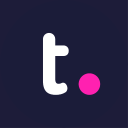From Side Project To 7-Figures: How Two Friends Grew Their Agency To $7.8M/Year
Hello! Who are you and what business did you start?
I’m Aaron, co-founder of Impression. Impression was founded in late 2012 by myself and a university friend, Tom. We were 21 and 26 at the time. We were both working in-house for a fast-growth renewable energy business and started Impression as a side project, working evenings and weekends in our bedrooms.
In our day jobs, we searched for an agency partner that could truly integrate into our marketing team, understand our challenges and meet our ambitious growth targets. When we couldn’t find one, we decided to create it. We started out by delivering services that would help a typical SME deliver against its strategy, executing paid media, SEO, and digital PR campaigns.
Six months after co-founding Impression, I left my full-time job and moved to consultancy, giving me the flexibility to focus more time on Impression without creating too many financial pressures. A year later, Tom and I were able to both be at Impression full-time, and we made our very first hire.
Fast forward to today, we’ve recently reached a milestone of employing 100 staff, have two offices in Nottingham and London and we’re on track to hit our next revenue target of...


















